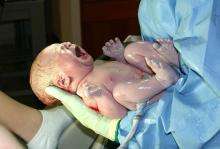February 15, 2016 report
Researcher calls for changes to auditory environment for preemies in neonatal care centers

(Medical Xpress)—Amir Lahav, an Assistant Professor of Pediatrics at Harvard Medical School, gave a presentation at this year's meeting of the American Association for the Advancement of Science recently, outlining what he described as premature babies being put into 'dungeon' incubators as they mature in hospital intensive care units—he believes the experience leads to learning disabilities for such children.
Lahav described experiments he and his colleagues have carried out where mothers of premature babies were asked to submit to recordings and then to allow for speakers to be placed inside of incubators to play those recordings to mimic the sounds (voice, heartbeat, etc.) a fetus would have heard had he or she been still inside the uterus up till the time they would have been born at term. Lahav reported that those babies had a larger auditory cortex at discharge than other preemies that were not exposed to the recordings and that they weighed more—they also more clearly responded to auditory cues, particularly from women.
The current common practice, he explained, is to place premature infants in an incubator that not only keeps them warm, but protects them against infections and other ailments, which is good. The problem come about when the preemie is put into an environment that ignores the growing brain—the brain during that time is developing very fast, he notes, and one of the things it is learning about is sound processing. In the absence of a steady heart beat, or the sound of a mother talking, or singing, or the myriad other noises that a fetus still inside the womb would naturally hear during a pregnancy, the brain doesn't have a chance to grow in a way that allows it to learn how to process such sounds. The result, he notes, is an increased rate of learning disabilities for babies born prematurely, particularly in auditory areas.
Lahav points out the stark contrast between the warm and safe womb atmosphere, and the sterile environment inside of an incubator where a preemie will hear nothing but the whir of a fan for hours on end, or on occasion, muffled voices from doctors or nurses. That needs to change, he concludes.
More information: Hospital Noise and Babies' Brains: Evidence from Premature Newborns, aaas.confex.com/aaas/2016/webp … gram/Paper16662.html
© 2016 Medical Xpress



















